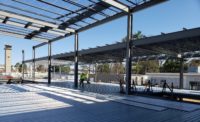D.C. Water's Biosolids Project Nears Completion
The District of Columbia's water and sewer authority is coming close to finalizing work on its $470-million biosolids project. George Hawkins, DC Water's general manager, says the 90%-complete project should be up and running by late summer or early fall.
The system will convert wastewater sludge from the Blue Plains advanced wastewater treatment facility, which currently treats approximately 370 million gallons a day of wastewater, into a Class-A biosolid using thermal hydrolysis. The process is a proven technology in Europe but has never been used to scale in the U.S.
The project includes four anaerobic digesters, four "Cambi" thermal hydrolysis treatment trains and a combined heat-and-power facility.
The centerpiece of the project is the thermal hydrolysis system, which will break down the sludge material using a combination of high temperature and pressure to make the biomass more easily digestible. The combined heat-and-power facility, which will begin operating in November, will capture the biogas created by the Cambi process, convert it into steam and then feed the steam back into the Cambi train in a continuous feedback loop.
According to Hawkins, convincing DC Water's board to try a new technology was an easy sell, given the financial benefits of doing so. "Relatively speaking, it was a fairly straightforward decision," he says.
Because the Cambi system is more efficient, fewer digesters needed to be built, an important incentive on a fairly constrained footprint, he says.
But before making the decision, the public utility invested a significant amount of time and effort into research, reviewing approximately 40 scientific papers written by engineering firms and universities to analyze the potential effectiveness of the technology and the system.





